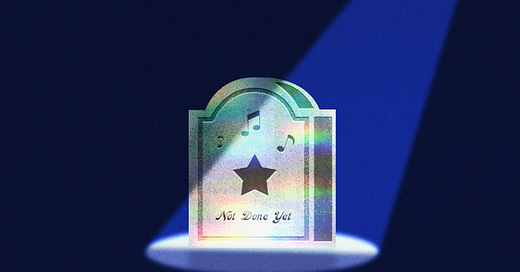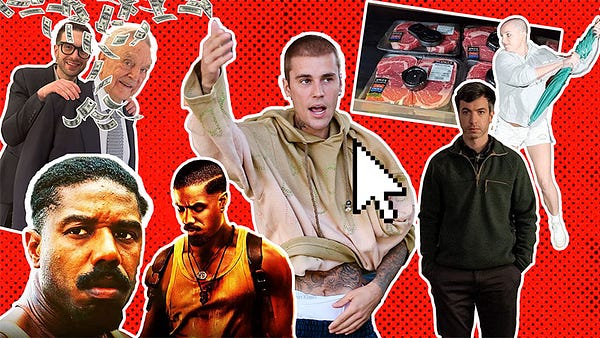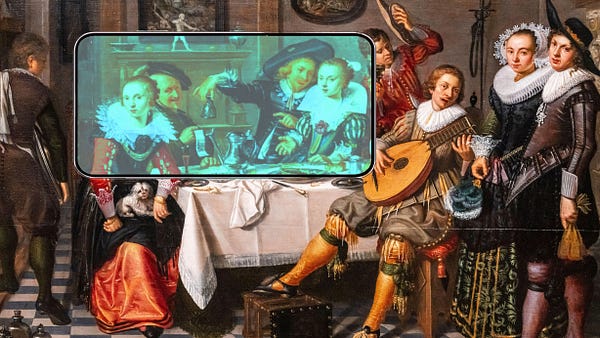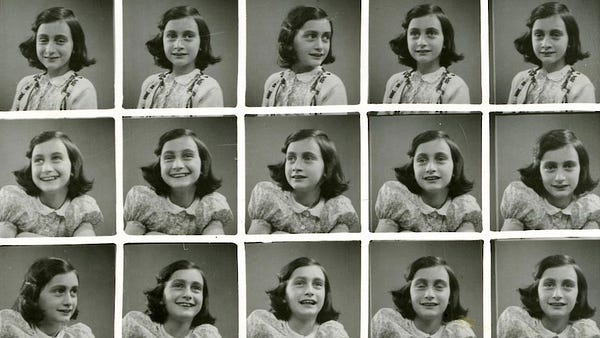
The Free Press

There’s a goosebump-inducing thrill in hearing a new Beatles song in 2023, as long as you don’t think too hard about the fact that half the band is dead.
The song, “Now and Then”—which debuted earlier this month at No. 7 on the Billboard 100—is a miracle of modern AI technology, extracting Lennon’s original 1970s demo from previously unusable recordings. Lennon’s voice sounds crisp and current, like he just recorded it yesterday.
But of course he didn’t. He’s been dead since 1980. And even if he weren’t, it’s debatable if the song would’ve sounded anything like the new release. Two of his pre-chorus bridges were cut by Paul McCartney, who had final say because, as previously noted, Lennon is dead.
George Harrison, who’s also dead—he passed away in 2001 from cancer—likely wouldn’t have been all too pleased either. He abandoned the band’s first attempts to record it in the ’90s, telling McCartney that the song was “fuckin’ rubbish.”
But hey, it’s a new Beatles song! Who cares if half of the members either didn’t want it recorded or probably would’ve liked a say in the final mix?
AI has plunged us into a very fuzzy ethical debate about just how much ownership we have over artists no longer with us. The late Freddie Mercury once (allegedly) said, “Do whatever you want with my music, but don’t make me boring,” but it still feels weird to hear him duet with Adele, a singer who was just three years old when Mercury died in 1991 from complications of HIV. Former Nirvana bassist Krist Novoselic hinted in a September interview that using AI to create new Nirvana songs sounds like “a good idea.”
The iconic French singer Edith Piaf, who died in 1963, will both narrate and appear in an upcoming biopic about her life, with the news announced just as SAG reached an uneasy truce with Hollywood studios over AI usage. Even the Rolling Stones, who released an album of new material in October (with just two original members), fully expect to continue performing after the grave. “When we’re all gone, there’ll still be AI so you won’t be able to get rid of us,” Mick Jagger said in an interview with CBS.
On the one hand, it’s amazing to think that the artists we love will never die. But on the other hand, it can start to feel like a scene from the movie Weekend at Bernie’s. How are we not just propping up the dead in different clothes, pretending nothing has changed? Jagger may be enthusiastic about AI now, but he’s still alive and has complete control over the band. That’ll change when he’s gone, and AI creators get the final say.
In the near future, many of the greatest artists of all time will be digitally exhumed for endless never-quite-farewell tours and creating new music long after their lungs have stopped functioning. Adam Lowenberg, the chief marketing officer for the music publishing company Primary Wave—a firm devoted to keeping deceased stars alive and working—has coined his own term for this new industry: “artist redevelopment.”
Though Lowenberg’s colleagues originally set out to buy publishing rights—his company, founded in 2006 by music industry veteran Larry Mestel, owns the back catalogs of Nirvana and Olivia Newton-John—the execs soon realized there was greater value hidden in the estates. Not just the music, but a dead star’s name, image, and likeness.
He’s currently working with the massively popular Korean boy band BTS, with plans to create new material featuring BTS vocalist V (né Kim Tae-hyung) and Bing Crosby, who died in 1977. “We’re trying to put something into play where there would be a brand-new duet, if you will, between Bing and V,” Lowenberg says.
Primary Wave is betting big on postmortem nostalgia. They invested $50 million for Crosby’s estate, $90 million for James Brown’s estate, and tens of millions to own 42 percent of Prince’s estate. In 2019, they bought half of Whitney Houston’s estate (her family owns the other half).
“There’s just so much to do with a star,” Primary Wave’s founder Mestel told The Free Press. “There is unlimited ability to create value.”
Value without the risks of a living musician. Dead artists can’t embarrass themselves on the Super Bowl halftime stage, or say the wrong thing on Twitter, or go berserk on amphetamines, or decide to dramatically change their sound or career path. They can’t die again, either.
That’s why WME, a talent agency catering to the biggest stars alive—like Drake, Bruno Mars, and the Foo Fighters—launched a management division nearly four years ago focused on the dead ones, such as rapper The Notorious B.I.G. and comedian Andy Kaufman. WME’s presence in the dead celebrity space kicked into overdrive when they brought on Phil Sandhaus, an entertainment industry veteran who’d previously worked with the estates of Judy Garland, Buddy Holly, and Nat King Cole.
“There are artists in this age bracket who are thinking ‘Okay, I’m not going to tour any longer. I’m going to start to consider a touring avatar and a show built around that,’ ” Sandhaus tells The Free Press.
But the bigger profits may come from artists no longer around to negotiate on their behalf or get in writing exactly how they want (or don’t want) their virtual likenesses used. Take Whitney Houston, the pop megastar who died in 2012 and had a career resurgence in 2019, when Norwegian DJ Kygo released a remixed version of her song “Higher Love,” that (as of this writing) has 800 million streams on Spotify. It led to a line of Houston-themed cosmetics, perfume, and a hologram concert called An Evening with Whitney that had an eight-month run in Las Vegas.
Not all artists are on board with the AI juggernaut coming their way. Ice Cube called an AI-generated duet between Drake and The Weeknd “demonic,” and Nick Cave suggested that AI “fuck off and leave songwriting alone.” Young Guru, Jay-Z’s personal engineer, shared a clip of an AI-generated Jay-Z vocal on Instagram in March, warning that we should “learn from past mistakes,” comparing it to Napster. And an AI creation of Johnny Cash singing Taylor Swift’s “Blank Space” makes a case that maybe artists, even the dead ones, should have some say in how their likenesses are used.
There seem to be two choices for artists going forward: they can either orchestrate their own virtual future while they’re still around to enjoy it—like the Swedish band ABBA did with their recent “reunion,” a holographic greatest hits show that’s running in London through early 2024—or they can be reimagined by others after they die—like the Lost Tapes of the 27 Club project, which used AI to generate “new” songs by artists who died at age 27, like Jimi Hendrix, Amy Winehouse, and Nirvana.
Singer-songwriter Grimes, for one, is enthusiastic about an AI future, even tweeting last April that she’d “split 50% royalties on any successful AI generated song that uses my voice.” A week later, she continued the discussion at the International Music Summit in Ibiza.
“If I was dead, I’d really like people to do it,” Grimes said of people using AI to generate music with her voice. “But I’m not sure everyone would agree. I feel like maybe Prince would’ve been up for it. If it was one of his friends doing it maybe. It’s a tricky one.”
Additional reporting by Suzy Weiss. Andrew Zucker’s writing has appeared in The New York Times, the Financial Times, and Air Mail, among other publications.
And to support more of our work, become a Free Press subscriber today:















The thing that bothers me most about all this is the stifling effect it will have on creativity, and even the market. We will end only hearing the sounds, or reading the writing styles, of decades past. New talent and ideas will be suppressed as all the money goes to “the sure thing.”
The new Beatles song is not rubbish, but it's not very good. I have heard all kinds of talk about the possibilities for good offered by AI. Call me a dinosaur. I'm against it. When Hal 9000 or Commander Data is put in charge of me I'm going to resist.